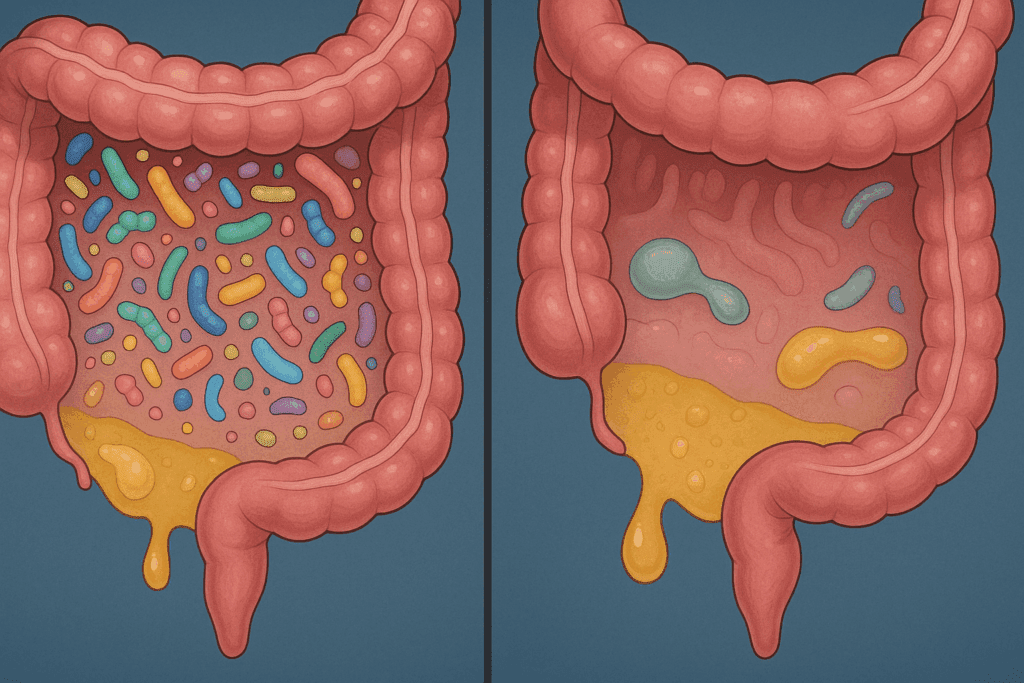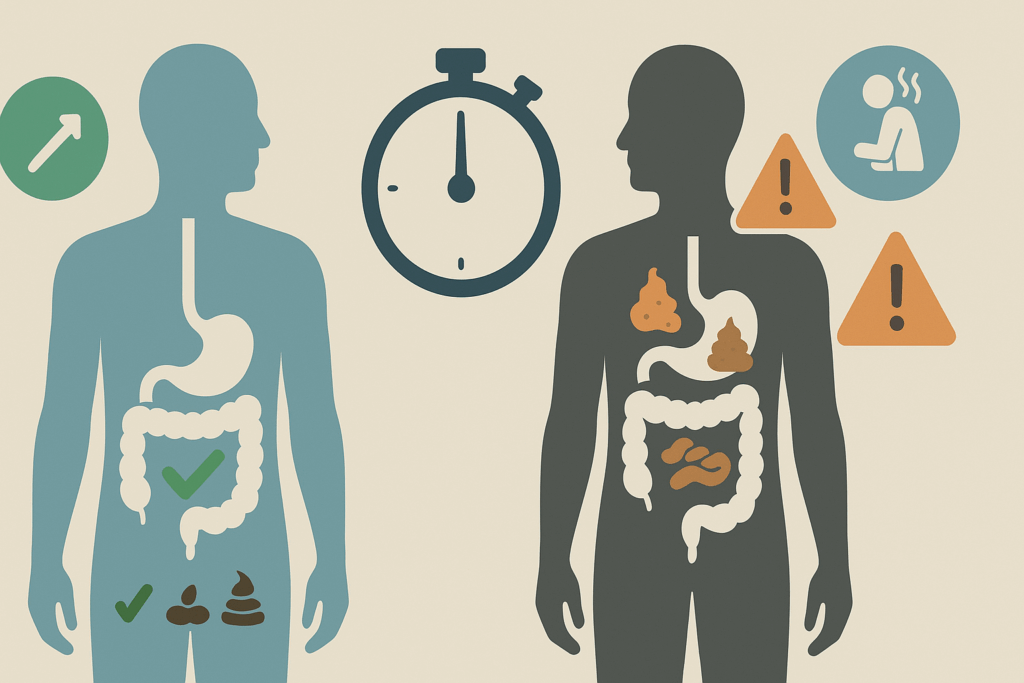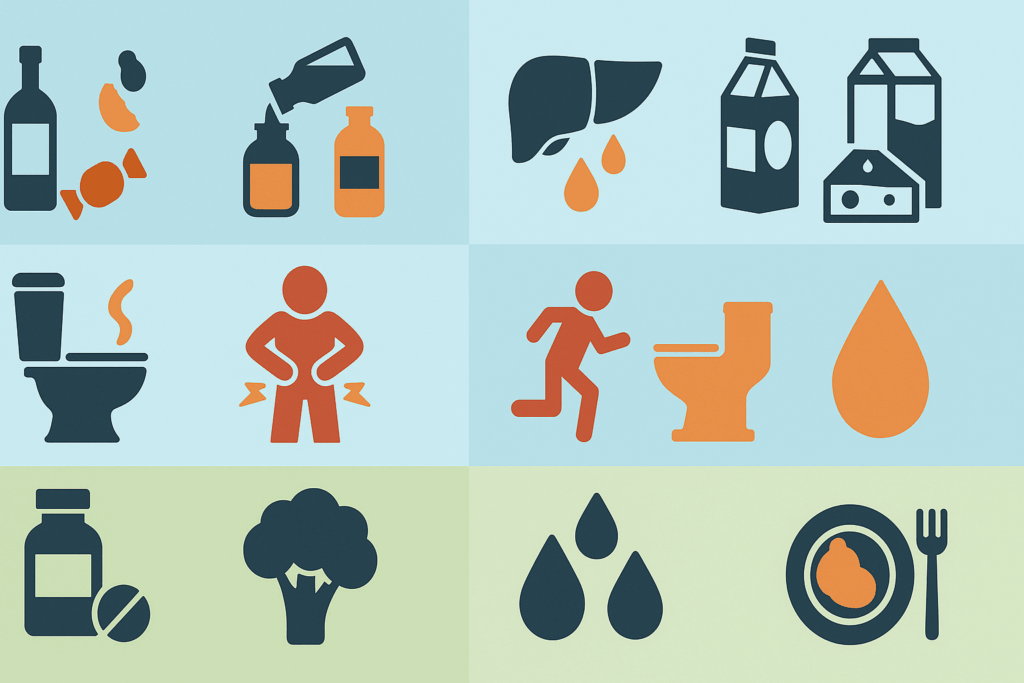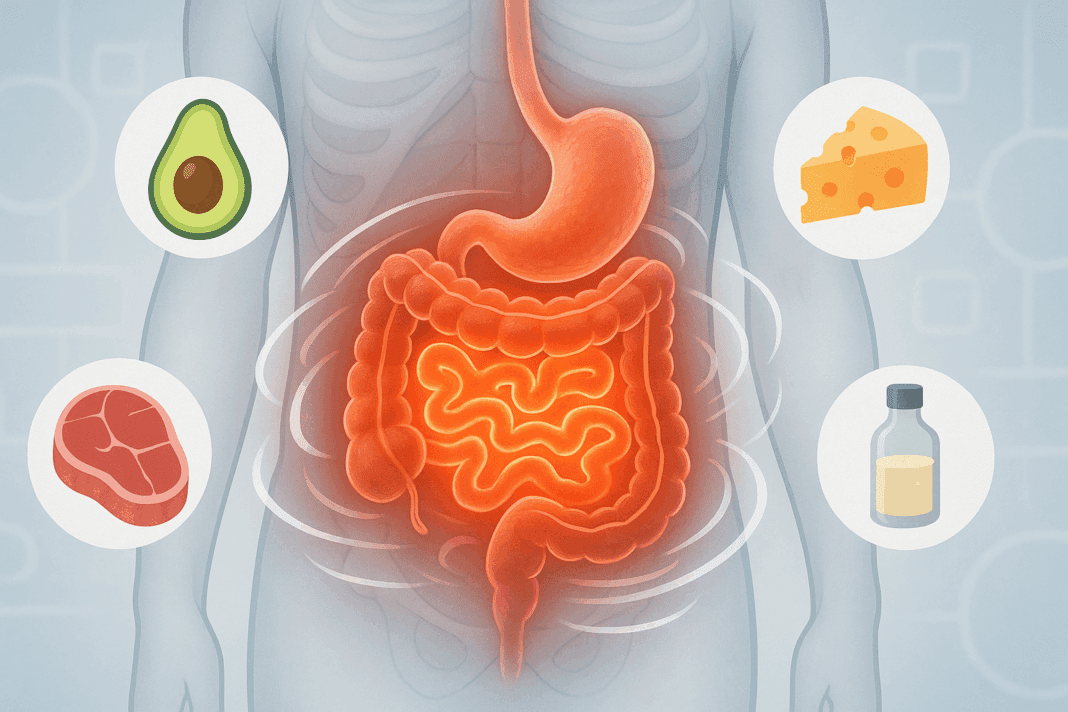The ketogenic diet, often simply called keto, has surged in popularity for its dramatic impact on weight loss, blood sugar regulation, and energy levels. This high-fat, very low-carbohydrate diet forces the body to shift from using glucose to burning fat for fuel, a state known as ketosis. However, for many individuals beginning their keto journey, this metabolic shift comes with an unexpected and often uncomfortable side effect: diarrhea. Reports of keto diarrhea have become common, especially in the early stages of transitioning to the diet. While it may seem like a sign that something is going wrong, understanding the physiological and dietary mechanisms behind this digestive response can help ease symptoms and offer strategies to manage them effectively.
For readers exploring whether the ketogenic diet is a good fit, or for those already navigating its initial challenges, it is important to examine not only the symptoms but also the root causes of diarrhea on the keto diet. By grounding this discussion in current nutritional science, digestive physiology, and clinical insights, this article will provide a reliable and comprehensive understanding of why keto can cause diarrhea, what to expect, and how to adapt without abandoning the diet altogether. Our goal is to support an evidence-based and experience-informed approach rooted in EEAT principles—Experience, Expertise, Authoritativeness, and Trustworthiness—while ensuring medically accurate and reader-friendly guidance.
You may also like: Is the Keto Diet Safe or Dangerous? What Experts Say About the Risks, Benefits, and Basics of the Ketogenic Diet

How the Keto Diet Alters Your Digestive System
When the body transitions into ketosis, the abrupt change in macronutrient ratios can profoundly affect gastrointestinal function. A traditional Western diet often includes 45-65% carbohydrates, which feed gut bacteria and support regular bowel movements. Shifting to a keto diet slashes carb intake to around 5-10%, dramatically reducing the fiber-rich grains, fruits, and legumes that help regulate stool consistency. This sudden absence of fermentable fiber can disrupt the gut microbiota, the community of bacteria residing in the intestines, which play a vital role in digestion and immune regulation.
Simultaneously, the increased intake of dietary fats prompts the liver to produce more bile, the fluid responsible for emulsifying fats in the digestive tract. For individuals whose bodies aren’t accustomed to metabolizing large quantities of fat, this surge in bile production can overwhelm the digestive system. Unabsorbed fats and excess bile can lead to steatorrhea—the presence of fat in the stool—which manifests as loose, greasy, and foul-smelling diarrhea. This is one of the primary reasons why keto diarrhea often occurs early in the diet transition period.
Moreover, certain sugar alcohols and artificial sweeteners commonly used in keto-friendly products—such as erythritol, sorbitol, and xylitol—can exert an osmotic effect in the gut. These substances draw water into the intestines, leading to loose stools or urgent bowel movements. Even for people not on keto, these sugar alternatives can cause gastrointestinal discomfort in large amounts, but on a diet that emphasizes low-carb sweet alternatives, the risk of diarrhea increases. Therefore, multiple concurrent changes during the early stages of keto can set the stage for gastrointestinal upheaval.

Identifying Common Triggers of Diarrhea on the Keto Diet
Not all individuals on the ketogenic diet will experience diarrhea, but those who do often encounter it due to several overlapping dietary and physiological factors. One of the most prevalent contributors is the abrupt increase in dietary fat. While healthy fats are essential for ketosis, many beginners introduce large quantities of oils, butter, cream, and fatty meats without giving the body time to adjust. The pancreas, which produces enzymes needed to digest fat, may initially struggle to keep pace with this dietary shift, resulting in undigested fat passing through the intestines and triggering diarrhea.
Additionally, the type of fat consumed plays a critical role. Medium-chain triglycerides (MCTs), found in coconut oil and MCT oil supplements, are rapidly absorbed and metabolized but can cause gastrointestinal distress when consumed in large doses. These oils are popular in the keto community for their quick conversion into ketones, yet they are notorious for causing loose stools if not introduced gradually. For individuals already experiencing keto diarrhea, large servings of MCTs can exacerbate symptoms.
Another often-overlooked culprit is magnesium supplementation. Magnesium is commonly taken by keto dieters to combat muscle cramps and electrolyte imbalances. However, many forms of magnesium—especially magnesium citrate and magnesium oxide—have a laxative effect. While useful for occasional constipation, they can easily tip the scales toward diarrhea when taken in higher-than-needed doses or in combination with other diarrhea-inducing factors on keto.
In some cases, a previously undiagnosed intolerance to dairy or gluten may become more apparent on the keto diet. Since keto often increases the intake of cheese, cream, and butter, individuals who are lactose intolerant may suddenly consume more lactose than their body can handle. The result is gastrointestinal distress, including bloating, cramping, and diarrhea. Understanding whether these food sensitivities are contributing to symptoms can be essential for long-term success on the diet.

How to Tell If Keto Diarrhea Is Temporary or a Sign of a Bigger Issue
In many cases, diarrhea on the keto diet is temporary, typically resolving within the first few weeks as the body adjusts to a new fuel source and increased fat intake. This adaptation period, often referred to as the “keto flu,” includes symptoms like fatigue, irritability, headaches, and gastrointestinal issues, including diarrhea. As enzyme production and bile regulation stabilize, stool consistency usually returns to normal. However, not all cases of keto diarrhea should be dismissed as a passing phase.
Persistent, severe, or worsening diarrhea warrants closer examination. If diarrhea continues for more than two to three weeks without signs of improvement, it could indicate malabsorption issues, gallbladder dysfunction, or even underlying gastrointestinal conditions that are being unmasked by dietary changes. Chronic diarrhea can lead to dehydration, nutrient deficiencies, and electrolyte imbalances, which may exacerbate other keto-related symptoms like muscle cramps and fatigue. In such cases, consulting a healthcare professional is essential.
Stool appearance can also provide clues. Oily, floating stools with a foul odor may suggest steatorrhea, a sign that fats are not being properly absorbed. This may indicate a need for digestive enzyme support, such as lipase supplementation, or could signal more serious issues like pancreatic insufficiency. Alternatively, watery diarrhea without oiliness may point toward osmotic effects from sugar alcohols or food sensitivities. Keeping a detailed food and symptom journal can help identify patterns and triggers, enabling more informed discussions with a registered dietitian or physician.

Practical Strategies to Prevent and Manage Keto Diarrhea
Fortunately, there are several evidence-based strategies to reduce the incidence and severity of keto diarrhea. One of the most effective is to gradually transition into ketosis rather than adopting an all-or-nothing approach. By slowly increasing fat intake and decreasing carbohydrate consumption over a period of one to two weeks, the body has time to upregulate fat-digesting enzymes and adapt to the increased bile output. This gentle transition can significantly reduce the gastrointestinal shock that leads to diarrhea on the keto diet.
Incorporating a moderate amount of low-carb, non-starchy vegetables such as spinach, zucchini, cauliflower, and avocado can also help. These foods provide fiber without excess carbohydrates, supporting healthy digestion and adding bulk to stools. While keto is inherently low in fiber compared to high-carb diets, strategic vegetable intake can mitigate constipation and diarrhea alike by promoting more regular bowel movements and nourishing beneficial gut bacteria.
Another helpful intervention involves managing the use of sugar alcohols and artificial sweeteners. Reducing or eliminating erythritol, sorbitol, and xylitol from the diet can help stabilize digestion. Instead, natural non-laxative alternatives like stevia or monk fruit may be better tolerated by sensitive individuals. Reading ingredient labels carefully and tracking digestive responses to specific products can be key in identifying and avoiding problematic sweeteners.
For those experiencing fat-related digestive issues, using bile salt supplements or digestive enzymes containing lipase may provide relief. These supplements support the breakdown and absorption of dietary fats, reducing the likelihood of steatorrhea and improving overall stool consistency. It’s also advisable to start with smaller portions of fatty foods and gradually build up tolerance, particularly when consuming MCT oil or other concentrated fat sources.
When to Seek Medical Advice for Ongoing Digestive Symptoms
Although mild keto diarrhea often resolves with time and dietary adjustments, certain red flags should prompt professional evaluation. Persistent diarrhea that leads to significant weight loss, dehydration, or electrolyte imbalance is a serious concern. If symptoms are accompanied by blood in the stool, fever, or signs of nutrient deficiency, such as brittle nails, hair loss, or fatigue, medical consultation is necessary.
Long-term malabsorption can have cascading effects on health, impairing immune function, bone density, and cardiovascular health. If diarrhea on the keto diet is unresponsive to basic dietary interventions or if symptoms worsen despite following best practices, a physician may recommend further testing. This could include stool studies, pancreatic enzyme tests, gallbladder function assessments, or evaluations for conditions like celiac disease, irritable bowel syndrome (IBS), or inflammatory bowel disease (IBD).
For individuals with a history of gastrointestinal disorders, adopting keto without medical guidance may exacerbate pre-existing conditions. A registered dietitian specializing in low-carb or ketogenic nutrition can help personalize the diet to meet individual needs while minimizing side effects. Adjustments may include a modified ketogenic approach, higher-fiber variants of keto, or temporary supplementation with probiotics to support gut microbiota.

Supporting Long-Term Digestive Health on the Keto Diet
Once the initial adjustment period has passed, maintaining healthy digestion on keto becomes more manageable. Hydration plays a crucial role, as the ketogenic diet has a natural diuretic effect that can lead to fluid and electrolyte loss. Drinking adequate water and supplementing with sodium, potassium, and magnesium can support both hydration and bowel function. This is particularly important during exercise, hot weather, or illness, when fluid losses may increase.
Maintaining diversity in fat sources is another helpful strategy. Instead of relying solely on dairy and coconut oil, incorporating nuts, seeds, olive oil, fatty fish, and grass-fed meats can provide a broader spectrum of fatty acids while reducing the likelihood of intolerance to any one food group. This diversity supports overall nutrient balance and may help reduce the recurrence of keto diarrhea over time.
Gut microbiome support is equally important. Though many fiber-rich foods are restricted on keto, including fermented vegetables like sauerkraut or kimchi can introduce beneficial bacteria. These probiotic-rich foods help repopulate the gut with microbes that promote digestive resilience. Prebiotic foods like leeks, garlic, and asparagus (in moderate quantities) may also support microbial diversity without significantly impacting carbohydrate intake.

Frequently Asked Questions: Keto Diarrhea and Digestive Changes on the Keto Diet
1. Can keto diarrhea be a sign of something beneficial, like faster fat adaptation?
Interestingly, some nutritionists suggest that early episodes of keto diarrhea may reflect an accelerated metabolic shift as your body ramps up fat metabolism. When dietary fat increases abruptly, the digestive system works overtime to process and absorb it, which could initially overwhelm enzyme production. This doesn’t necessarily mean something is wrong; in fact, it could mean that ketosis is well underway. However, while rapid adaptation might sound beneficial, unmanaged diarrhea on the keto diet can still cause dehydration and nutrient depletion. Balancing this transition with supportive practices like digestive enzymes or slower macronutrient adjustments ensures that any benefits don’t come at the expense of gut health.
2. Does keto cause diarrhea more often in people who previously had digestive issues?
Yes, individuals with preexisting conditions like irritable bowel syndrome (IBS), lactose intolerance, or a history of gallbladder problems may be more likely to experience keto diarrhea. The high-fat nature of the diet can trigger dormant sensitivities or exacerbate underlying malabsorption issues. For example, people who already have a limited ability to digest fats may experience more pronounced symptoms when introducing a ketogenic eating pattern. In these cases, diarrhea on the keto diet may not resolve without addressing the root cause, such as low bile output or an imbalanced gut microbiome. A personalized approach that includes medical testing and professional dietary support is highly recommended for those with prior digestive challenges.
3. Are there emotional or psychological effects linked to persistent keto diarrhea?
While often overlooked, the emotional toll of persistent keto diarrhea can be significant. Frequent or urgent bowel movements can create anxiety, disrupt sleep, and lead to social embarrassment or isolation. This stress can, in turn, exacerbate gut-brain axis responses, potentially worsening gastrointestinal symptoms. For some individuals, the psychological burden of managing these side effects can reduce adherence to the diet altogether. Addressing mental health alongside physical symptoms is essential, especially when implementing long-term dietary changes that affect daily routines and social interactions.
4. Is it possible that certain keto-friendly products are misleading consumers and contributing to diarrhea?
Absolutely. Many commercially available “keto” snacks and supplements contain ingredients that are technically low-carb but may still cause gastrointestinal distress. Common culprits include sugar alcohols like maltitol and sorbitol, thickening agents like inulin, and poorly absorbed fibers. These can all lead to diarrhea on the keto diet, particularly when consumed in large quantities. Unfortunately, marketing labels such as “keto-approved” often don’t account for individual digestive tolerance. Consumers are encouraged to scrutinize ingredient labels and prioritize whole, minimally processed foods over packaged alternatives whenever possible.
5. Could prolonged keto diarrhea affect the absorption of essential vitamins?
Yes, chronic diarrhea on the keto diet can impair the absorption of fat-soluble vitamins like A, D, E, and K. Since these nutrients rely on healthy fat digestion and bile function for absorption, persistent loose stools may signal that the body isn’t properly processing these elements. Over time, deficiencies can develop even if you’re consuming adequate quantities through food or supplements. Symptoms of such deficiencies might include fatigue, poor immunity, or bruising. Monitoring blood levels and incorporating digestive aids may be necessary if symptoms persist beyond the adjustment period.
6. Are there cultural or regional variations in how people experience or manage keto diarrhea?
Cultural dietary habits and regional food availability can play a role in how keto diarrhea manifests and is managed. For instance, individuals from Mediterranean backgrounds might emphasize olive oil and fish over dairy and coconut oil, potentially reducing the likelihood of digestive issues. In contrast, Western keto adaptations often rely heavily on dairy and MCT oil, which can exacerbate symptoms. Moreover, fermented vegetables and traditional probiotic foods common in East Asian or Eastern European diets may provide a natural buffer against the gut disruptions that can occur. Adapting keto principles to align with cultural food traditions may help reduce the risk of keto diarrhea while supporting long-term dietary sustainability.
7. Does keto cause diarrhea in athletes or highly active individuals more frequently?
Highly active individuals may experience more pronounced digestive shifts when starting keto due to their already elevated metabolic demands. Their increased food intake, combined with the high-fat nature of keto meals, may tax digestive enzymes further. Additionally, athletes often supplement with performance-enhancing products like electrolyte drinks or protein powders, some of which contain sugar alcohols or fillers that can worsen gastrointestinal symptoms. Keto diarrhea in this population can also lead to greater performance deficits, as dehydration and micronutrient loss directly impair stamina and recovery. Athletes considering keto should monitor hydration closely and consider a phased approach to reduce gastrointestinal stress.
8. Are there any long-term microbiome effects from keto-related diarrhea?
Emerging research suggests that repeated episodes of keto diarrhea could influence the gut microbiome in complex ways. The ketogenic diet alters gut flora by reducing fermentable carbohydrates, which are key fuel sources for beneficial bacteria. When combined with diarrhea, which flushes out microbial colonies more rapidly, the result may be a reduction in microbial diversity. This could potentially affect immune modulation, mood, and even long-term metabolic health. Rebuilding gut diversity through carefully selected low-carb fiber and probiotic sources is an important step once digestive stability returns.
9. Is there a link between food timing and the risk of keto diarrhea?
Yes, meal timing and frequency can impact how the body handles fat digestion, which may influence the onset of diarrhea on the keto diet. Large, infrequent meals rich in fat can overwhelm the digestive system, particularly in individuals not used to high-fat intake. In contrast, spreading meals more evenly throughout the day may help the pancreas and liver produce enzymes and bile in a more manageable rhythm. This approach can reduce the likelihood of digestive overload and improve nutrient absorption. Individuals prone to keto diarrhea may benefit from experimenting with smaller, more frequent meals to minimize strain on the gut.
10. What emerging therapies or supplements show promise for reducing keto diarrhea?
In addition to traditional approaches like lipase supplements and digestive enzymes, newer therapies are being explored to address keto-related gastrointestinal issues. For example, ox bile supplements have gained attention for their ability to support fat digestion in individuals with sluggish bile flow. Prebiotic compounds tailored to low-carb diets are also in development, aiming to nourish gut bacteria without compromising ketosis. Some research is even exploring the use of postbiotics—metabolic byproducts of probiotics—to stabilize gut function. As our understanding of keto diarrhea deepens, innovations in personalized nutrition and microbiome-targeted therapies may offer more effective and individualized solutions.
Conclusion: Managing Keto Diarrhea with Confidence and Science
Understanding the causes and solutions for keto diarrhea empowers individuals to navigate the ketogenic diet with greater confidence and resilience. While digestive changes are a natural consequence of such a dramatic shift in macronutrient intake, they need not be a reason to abandon the diet altogether. For most individuals, diarrhea on the keto diet is temporary, manageable, and responsive to thoughtful adjustments in food choices, supplementation, and timing.
By identifying personal triggers, making gradual dietary changes, and using evidence-based interventions like digestive enzymes or probiotic support, it is entirely possible to thrive on keto without ongoing gastrointestinal distress. Above all, listening to the body, staying informed, and seeking professional guidance when necessary aligns with the EEAT principles that underpin responsible health content. Whether you are new to the ketogenic lifestyle or seeking to refine your current approach, understanding why keto causes diarrhea is the first step toward mastering your health journey with clarity, comfort, and care.
Further Reading:
Keto Diet Diarrhea — and How to Fix It
Why Keto Can Make You Constipated or Give You Diarrhea — and How to Deal
Keto diet and possible stomach problems


